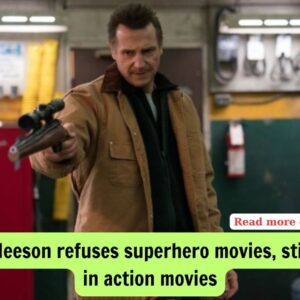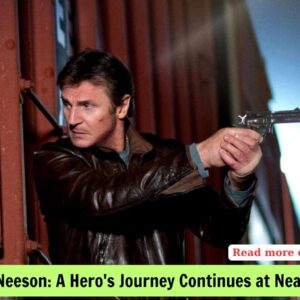
This is Liam Neeson’s bad-guy-stomping time of year.
He is an everyman avenger, a rangy vigilante who runs headlong into danger, pummelling villains and dodging bullets, knives, cars, bombs, fire and whatever unholy ploys cross his path of wreckage and redemption.
He is an antidote to injustice who in a couple of furious, implausible hours delivers the sweet taste of righteous empowerment. He may be bruised and slightly tainted, a bit creaky in the joints, but his heart is pure. Mostly.
The Commuter is Neeson’s latest tale of mayhem. Teaming up for the fourth time with Spanish director Jaume Collet-Serra, the actor, who has become his own action-thriller franchise, plays a 60-year-old insurance salesman heading home on a train from Manhattan after being fired.
He embodies middle-class angst, a wage earner of lost relevance and mounting bills. The mood is sombre, until a woman (Vera Farmiga), with a voice that sounds as if it slithered out of a martini, shows up with a deadly proposition.
The train accelerates and the plot veers into Neeson territory: danger, moral questions, pounding noise and the prospect of corpses. Neeson’s Michael Woolrich is balancing the limits of his body with hard-earned wisdom and a troubled spirit. He is a metaphor for our unsettled times, a burdened soul that is at once knowing and resigned to the bankers, hedge fund managers and politicians scheming far beyond his reach.

NOT-FOR-SYNDICATION
“It’s a corrupt world,” a friend tells him. “No good being the little guy.”
Bullets flit and fists fly. Like a number of Neeson’s thrillers, including Taken (2009), which spawned a series that has grossed nearly US$1 billion worldwide, The Commuter is a popcorn movie aimed to jolt the box office doldrums of winter.
Such films – most released early in the year – have marked a lucrative change of gears for a star whose earlier critically acclaimed roles in Schindler’s List and Michael Collins anointed him among the most gifted actors of his generation.
But in The Commuter, the 6-foot-4-inch Neeson doggedly – and with a bit of fun – rushes through train cars trying to find a mysterious passenger. The task, he is told, will save lives and earn him US$100,000. His face lined, his earnestness intact, Neeson, frantic and hair a-tumble, is reminiscent of characters in a western by John Ford or Howard Hawks.

Liam Neeson discusses The Commuter
“It’s about the man that stands up and decides enough is enough. Gary Cooper. John Wayne. Jimmy Stewart,” says Neeson, whose accent reflects his Northern Ireland roots. “God, I would have loved to have been back in those days.
I would have loved to have been a John Ford player and experienced that Hollywood system. Ford and Howard Hawks told morally complicated stories in 90 minutes. Now these directors give you these things in 3 hours and 10 minutes, it’s like I can’t stand it, it’s so frigging long.”
Though Neeson’s work echoes of Gary Cooper’s lone sheriff and Cary Grant’s unsuspecting Hitchcock characters, it also calls to mind films starring Mel Gibson (Payback), Matt Damon (the Bourne films), Clint Eastwood (Grand Torino) and 1970s tough-guy Charles Bronson (Death Wish).
All are men propelled into violence by forces that challenge their integrity and threaten their fixed notions of the world.
They are stitched into a genre – part vigilante, part tragic hero – that strips a character to his primal instincts in order to protect what he holds dear or to exact a steep cost for what he has lost.
Bruce Willis will star this year in a remake of Death Wish, the story of a doctor out to avenge the murder of his wife and assault of his daughter.

Such films resound in troubled political and economic times when faith in institutions wavers and the individual is left to stand for himself.
They conjure a rugged populism – the brand President Trump and Senator Bernie Sanders tap into – and a vicarious thrill to take charge, to tame lurking dangers and emerge battered but redeemed.
“I like the idea of playing an everyman,” Neeson says about The Commuter. “You see these anonymous men coming into the city, getting on with their jobs and their work. It’s nice to enter that kind of world, being sort of Mr. Average.
He’s got a mortgage and a wife and a kid about to go to college. We’re always worried about where the money’s going to come from.”
There’s plenty more phone action for Liam Neeson in The Commuter.
“When are we going to be replaced by somebody younger or more capable?” says Collet-Serra, whose films with Neeson have grossed more than US$420 million. “I wanted him [Neeson] to go on a journey where he gets rejected in the beginning but relies on his experience to get his mojo back. At the end of the day, you’re the only one who can say when you are done.”
Neeson’s action movies over the last 10 years have been outlandish escapism, whether he’s confronting a serial killer on an airplane in Non-Stop (2014), taking on mobsters in Running All Night (2015), or rampaging through Paris searching for his kidnapped daughter in Taken.
When he’s after a bad guy, he’s like the flu, pervasive and persistent with an uncanny ability to escape whatever fusillade of hell is raining upon him. But five years shy of 70, he does not do his own stunts.
“I’m not Jackie Chan. I don’t jump out of windows. I leave that to the professionals. But I love doing my own fighting.
I insist on that,” says Neeson, a former amateur boxing champion with the All Saints Club in Northern Ireland.
“But I’m not trying to be 32 years of age. We were careful with The Commuter that I fight as a 60-year-old man.
Yes, he was a guy who used to be an ex-cop and would have known certain moves in apprehending bad guys. But he’s very rusty.”
He may be, but he also found a groove that few might have anticipated in 1993 after his Academy Award-nominated role as a World War II German industrialist who saved Jews in Steven Spielberg’s Schindler’s List.
The Guardian newspaper recently wrote: “It would have been unthinkable to suggest, pre-Taken, that Liam Neeson – soulful, mournful, capital-A actor Liam Neeson from Schindler’s List – would spend a decade punching people and jumping over things in an apparently ceaseless procession of generic B-movies.
It would have been like suggesting that Daniel Day-Lewis was going devote his life to gross-out comedy, or that Mark Rylance should sign up as the lead of a vampire gangster franchise called Bloodburst Hookers Extreme.”
Neeson’s action hero allure ignited when he approached producer-writer Luc Besson about playing Bryan Mills, a former CIA agent who relies on the tools of his craft – his famous “particular set of skills” – to track down Albanian sex traffickers who have disappeared with his daughter in Paris.
“I’d always thought it as a small European thriller that would probably go straight-to-video.
But Fox made a big success out of it,” says Neeson. “Hollywood started seeing me in a different light and started sending me action scripts. I was like a kid in a candy store.”
He added: “I like whodunits, having audiences guess. ‘Oh, it was him. Oh, it was her. No, maybe it was him’.
Audiences get a kick out of those types of stories. You don’t really see enough of them in cinema other than the ones Jaume and I make. There’s something kind of old-fashioned about them, but they still work.”
News
“Liam Neeson’s Surprise: Shocking Appearance Raises Eyebrows on the Street”
Liam Neeson, 63 years old, famous actor with a series of roles in action movies: “Taken”, “Non-stop”… appeared thin and haggard on the streets of New York…
“Liam Neeson on Embracing Action Roles at 70: ‘I’m Getting Away with It’”
Liam Neeson is looking back at becoming an unlikely action star with 2008’s Taken Liam Neeson’s age isn’t getting in the way of his status as an action…
Liam Neeson refuses superhero movies, still acts in action movies
Although Liam Neeson has no plans to star in any more superhero movies, he said he will continue to participate in action movies. (Photo: The Playlist) Liam…
“Liam Neeson Delves into ‘Honest Thief’, Reflects on ‘Darkman’ Memories, and Addresses the Star Wars Reunion Rumors”
He also reveals which of his films he’d love to have revisited with a sequel. From writer/director Mark Williams (co-creator of the Netflix series Ozark), the crime drama Honest Thief tells the…
Liam Neeson’s action thriller suffers due to predictable twists, rushed ending
Liam Neeson’s Retribution is strictly a one-time watch for action star’s fans. However, a few of them might get disheartened as well. Liam Neeson’s films of late…
“Is ‘Made In Italy’ Worth the Watch? Analyzing Liam Neeson’s Movie Reviews and Rotten Tomatoes Scores”
The Liam Neeson movie Made In Italy is currently proving surprisingly popular on Netflix, but is this largely forgotten 2020 dramedy worth watching? SUMMARY Made In Italy…
End of content
No more pages to load







